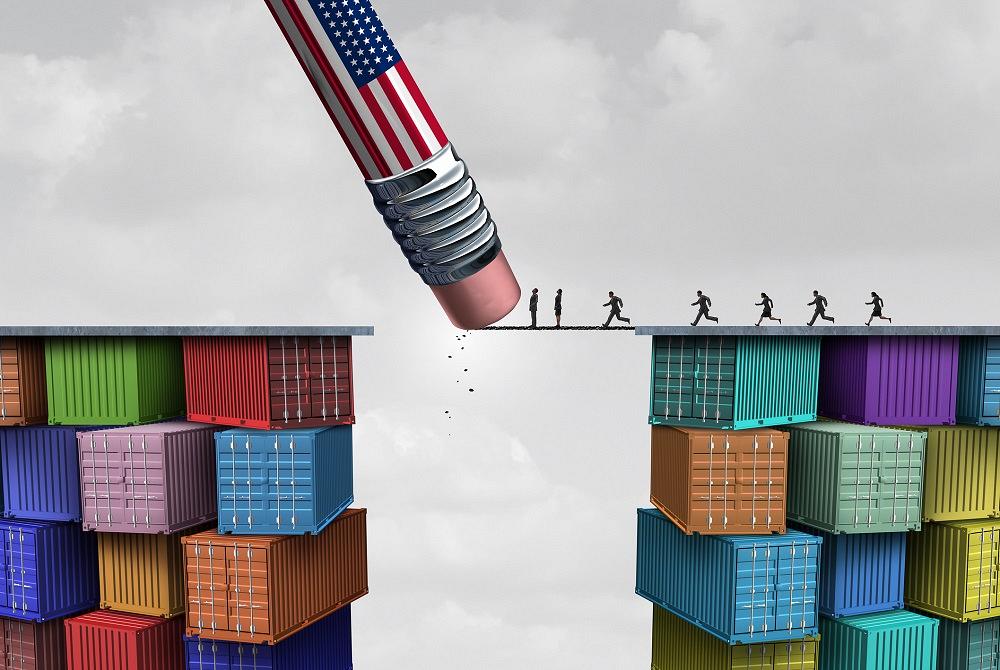Sr. Digital Editor
- FMA
- The Fabricator
- FABTECH
- Canadian Metalworking
Categories
- Additive Manufacturing
- Aluminum Welding
- Arc Welding
- Assembly and Joining
- Automation and Robotics
- Bending and Forming
- Consumables
- Cutting and Weld Prep
- Electric Vehicles
- En Español
- Finishing
- Hydroforming
- Laser Cutting
- Laser Welding
- Machining
- Manufacturing Software
- Materials Handling
- Metals/Materials
- Oxyfuel Cutting
- Plasma Cutting
- Power Tools
- Punching and Other Holemaking
- Roll Forming
- Safety
- Sawing
- Shearing
- Shop Management
- Testing and Measuring
- Tube and Pipe Fabrication
- Tube and Pipe Production
- Waterjet Cutting
Industry Directory
Webcasts
Podcasts
FAB 40
Advertise
Subscribe
Account Login
Search
CAMMU letter to Senate Finance Committee urges sunset provision to Section 232 tariffs
Coalition states that tariffs are only hurting U.S. manufacturers that rely on steel and aluminum
- By Gareth Sleger
- November 20, 2019

In a letter to the Senate Finance Committee, a coalition of U.S. metalworkers and other manufacturing industries have reignited pressure to put an end to the ongoing Section 232 steel and aluminum tariffs. Getty Images
A coalition of U.S. metalworkers and other manufacturing industries have reignited pressure to put an end to the Section 232 steel and aluminum tariffs imposed by President Donald Trump’s administration.
In a letter this week addressed to Senate Finance Committee Chairman Charles Grassley (R-Iowa) and Ranking Member Ron Wyden (D-Oregon), the Coalition of American Metal Manufacturers and Users (CAMMU) strongly encourages the committee to include a sunset provision for the steel and aluminum tariffs in any comprehensive 232 tariff reform legislation considered by the committee. The letter was also signed by the American Association of Exporters and Importers, Auto Care Association, Flexible Packaging Association, and National Foreign Trade Council.
The letter emphasizes that the only Section 232 tariffs currently in place are on steel and aluminum imports, and that these tariffs (25 percent on imported steel and 10 percent on imported aluminum) are causing damage to U.S. manufacturers and the economy.
“After 18 months of the Section 232 steel and aluminum tariffs, it is clear that these tariffs are contributing to a weakening of the U.S. economy, particularly in the manufacturing sector,” the letter states. This is the second statement CAMMU has released this year regarding Section 232 tariffs.
According to data from a Peterson Institute for International Economics report in May, U.S. consumers and businesses have been paying more than $900,000 annually for every job "saved" or created by the steel and aluminum tariffs. The coalition also cited data signifying a growing slowdown in manufacturing and the laying off of hundreds of Midwest steel mill workers.
The September Institute for Supply Management (ISM) Report on Business registered its lowest Purchasing Managers’ Index (PMI), 47.8 percent, in a decade. Also in September, The Times of Northwest Indiana reported that U.S. Steel layoffs displaced more than 300 workers at a Chicago-area facility due to “indefinite idling.” U.S. Steel disputed the number, saying the layoffs totaled around 150 employees.
“Price fluctuation, delivery delays, and uncertainty caused by the tariffs are contributing factors to a slowdown in the manufacturing sector,” the letter states. “Unfortunately, it is not surprising that the negative impacts of the Section 232 steel and aluminum tariffs are now being felt by the domestic steel industry. When domestic steel- and aluminum-using companies struggle, it does not take long for their suppliers to also struggle.”
CAMMU is a broad organization of U.S. businesses and trade associations representing more than 30,000 companies and more than 1 million American workers in the manufacturing sector and the downstream supply chains of a wide variety of industries. Its members say it takes issue with Grassley not willing to include a sunsetting provision for the current 232 tariffs in compromise legislation.
“While compromise is vital to come to agreement on comprehensive reform legislation, it is the current 232 steel and aluminum tariffs that are causing actual economic harm today to steel and aluminum users and producers,” the letter states. “Reforming the 232 statute without allowing for an end to the current steel and aluminum tariffs would ensure that this harm continues with no end in sight. Reform legislation that mandates congressional oversight over future 232 cases while ignoring ongoing actions undermines the basic premise of any legislative action to restore the constitutional authority of Congress."
Earlier this month, Grassley made these comments regarding tariff reform:
“I’ve been clear that I’m generally not a fan of tariffs. But I also want to make clear that I’ve agreed to Senator Wyden’s request to introduce a chairman and ranking member’s mark that does not unwind the Section 232 measures on steel and aluminum. Many problems with those tariffs and quotas have been well-documented, but I’ve been in the Senate long enough to know that getting things done requires compromise. ... I don’t view Section 232 reforms as weakening the power of the chief executive. I view them as enhancing the effectiveness of the chief executive and our country. As the Supreme Court told President Truman in 1952, the president is strongest when he has Congress behind him. We need reforms to Section 232 that make it clearer where Congress stands on national security and trade. Such reforms would also make it clearer to our trading partners that when Section 232 is used, Congress stands with the president.”
Here is Grassley's Section 232 comment in full:
In the letter, CAMMU also points out that the initial purpose of the tariffs was to offer a temporary boost to the U.S. steel industry, but that the target of increased production has long come and gone.
A February 2018 report to Trump on the Commerce Department’s investigation into steel and aluminum imports from Commerce Sec. Wilbur Ross stated that the tariffs were to “increase domestic steel production from its present 73 percent of capacity to approximately an 80 percent operating rate.” According to a study from the American Iron and Steel Institute, however, that objective was reached by the steel industry as early as September 2018.
And now, after more than a year of hitting that production benchmark, CAMMU says the tariffs are only resulting in negative consequences for domestic manufacturers that use steel and aluminum.
“We appreciate the desire for bipartisan, compromise legislation that has a chance of seeing Senate floor action this Congress. However, 232 reform legislation that does not allow for a robust congressional debate and decision on the current steel and aluminum tariffs would allow these tariffs that are causing actual harm to U.S. manufacturers to continue with no competent exclusion process in place and no future relief in sight,” the letter goes on to state. “We urge you to include a sunsetting provision that addresses current 232 tariffs in the mark that goes before the Senate Finance Committee to allow for a debate on these harmful tariffs and to ensure all stakeholders have a voice in the process.”
subscribe now

The Fabricator is North America's leading magazine for the metal forming and fabricating industry. The magazine delivers the news, technical articles, and case histories that enable fabricators to do their jobs more efficiently. The Fabricator has served the industry since 1970.
start your free subscriptionAbout the Author

- Stay connected from anywhere

Easily access valuable industry resources now with full access to the digital edition of The Fabricator.

Easily access valuable industry resources now with full access to the digital edition of The Welder.

Easily access valuable industry resources now with full access to the digital edition of The Tube and Pipe Journal.
- Podcasting
- Podcast:
- The Fabricator Podcast
- Published:
- 04/16/2024
- Running Time:
- 63:29
In this episode of The Fabricator Podcast, Caleb Chamberlain, co-founder and CEO of OSH Cut, discusses his company’s...
- Trending Articles
AI, machine learning, and the future of metal fabrication

Employee ownership: The best way to ensure engagement

Steel industry reacts to Nucor’s new weekly published HRC price

Dynamic Metal blossoms with each passing year

Metal fabrication management: A guide for new supervisors

- Industry Events
16th Annual Safety Conference
- April 30 - May 1, 2024
- Elgin,
Pipe and Tube Conference
- May 21 - 22, 2024
- Omaha, NE
World-Class Roll Forming Workshop
- June 5 - 6, 2024
- Louisville, KY
Advanced Laser Application Workshop
- June 25 - 27, 2024
- Novi, MI


























